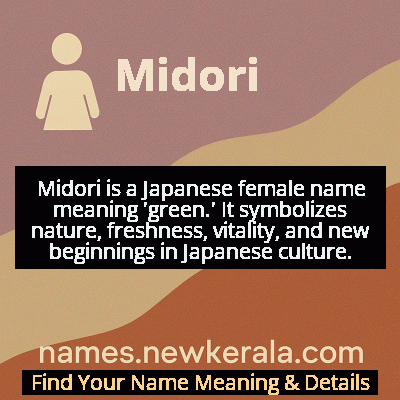Midori Name Meaning & Details
Origin, Popularity, Numerology Analysis & Name Meaning of Midori
Discover the origin, meaning, and cultural significance of the name MIDORI. Delve into its historical roots and explore the lasting impact it has had on communities and traditions.
Name
Midori
Gender
Female
Origin
Japanese
Lucky Number
5
Meaning of the Name - Midori
Midori is a Japanese female name meaning 'green.' It symbolizes nature, freshness, vitality, and new beginnings in Japanese culture.
Midori - Complete Numerology Analysis
Your Numerology Number
Based on Pythagorean Numerology System
Ruling Planet
Mercury
Positive Nature
Adventurous, dynamic, curious, and social.
Negative Traits
Restless, impatient, inconsistent, prone to indulgence.
Lucky Colours
Green, white.
Lucky Days
Wednesday.
Lucky Stones
Emerald.
Harmony Numbers
1, 3, 9.
Best Suited Professions
Sales, marketing, travel, entertainment.
What People Like About You
Versatility, charisma, adventurous spirit.
Famous People Named Midori
Midori Goto
Violinist
World-renowned classical violinist who debuted at age 11 with the New York Philharmonic
Midori Ito
Figure Skater
First woman to land a triple axel in competition and 1989 World Champion
Midori Francis
Actress
Known for roles in 'The Sex Lives of College Girls' and 'Dash & Lily'
Midori Matsuya
Pianist
Celebrated Japanese classical pianist and recording artist
Name Variations & International Equivalents
Click on blue names to explore their detailed meanings. Gray names with will be available soon.
Cultural & Historical Significance
Historically, names derived from colors were common among aristocratic families during the Heian period, and Midori maintains this elegant tradition while remaining accessible to all social classes in modern Japan. The name also connects to Japan's agricultural heritage, where green symbolizes growth, fertility, and the life-giving power of rice paddies and forests that have sustained Japanese civilization for centuries. This cultural background gives the name Midori a sense of both aristocratic elegance and earthy, practical wisdom.
Extended Personality Analysis
Women named Midori are often perceived as having calm, nurturing personalities with a strong connection to nature and harmony. They tend to be patient, growth-oriented individuals who value stability and tradition while maintaining an open-minded approach to new experiences. The green association suggests someone who is balanced, refreshing to be around, and possesses healing qualities in their relationships.
Midoris are typically seen as reliable friends and family members who provide emotional support and practical wisdom. Their connection to nature often manifests in environmental awareness, artistic sensibilities, or interests in gardening and outdoor activities. While generally peaceful, they can display remarkable resilience and adaptability when faced with challenges, much like plants that bend with the wind but don't break. This combination of gentle strength and natural wisdom makes Midoris valued members of their communities who bring a sense of calm and growth to those around them.
Modern Usage & Popularity
In contemporary Japan, Midori remains a popular but not overly common name choice for girls, consistently ranking in the top 200-300 names over recent decades. The name has seen a slight resurgence as environmental awareness grows and parents seek names with natural meanings. While traditional in origin, Midori doesn't sound dated to modern Japanese ears and maintains its fresh, vibrant image. Internationally, the name has gained some recognition through famous bearers like violinist Midori Goto, making it more familiar outside Japan. The name is particularly favored by parents who appreciate its clear, pleasant sound and positive associations with nature and growth without being overly trendy or common.
Symbolic & Spiritual Meanings
Symbolically, Midori represents much more than just the color green—it embodies the entire cycle of life, growth, and renewal. The name carries connotations of hope, new beginnings, and the enduring power of nature to heal and restore. In Japanese symbolism, green is associated with eternal life, youthfulness, and vitality, making Midori a name that suggests perpetual freshness and resilience. It also represents balance and harmony, as green sits in the middle of the color spectrum, suggesting someone who can mediate and bring people together. The name metaphorically connects to spring's renewal, the lushness of summer, and the enduring evergreen that persists through winter's challenges, making it a powerful symbol of perseverance and natural wisdom that transcends its literal meaning.

